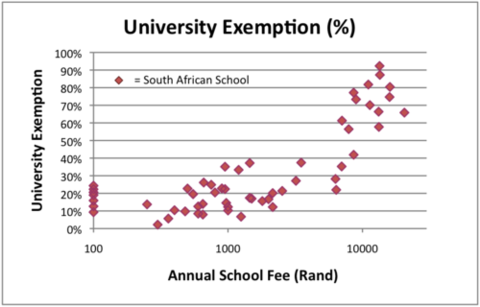
Just over a year ago I was approached by Andrew Einhorn, a UCT grad student, who was interested in implementing an online maths program at Makhaza. All he needed was access to the lab, access to a class and a tutor. A year down the line not only he has completely revamped two of our branches labs in Makhaza and Nyanga, established a formal Khan Academy program in these branches (as well as other locations in Cape Town and rural Eastern Cape), but has produced results at very low costs, and is piloting in schools for 2013.
His passion for creating high impact and stimulating learning environments in township and rural locations often only privy to the wealthy few has seen him start Numeric, an NGO interested in finding ways to bring Khan Academy to South Africa and make it a useful resource to both teachers and learners. He presented an inspiring TEDxUCT talk last year outlining the background, as well as the impact and results Numeric has had. He also posted the following blog on the Khan Academy website:
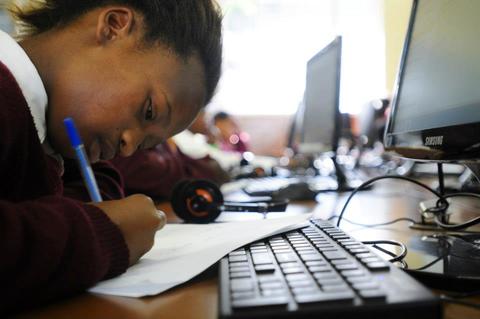
A little over 15 months ago, we started an experiment. We wanted to know if Khan Academy was viable in township (slum) areas in South Africa and if so, what type of impact it might have on numeracy. Numeracy in South Africa is astonishingly weak, with just 2% of Grade 9s scoring over 50% on the annual national assessments in 2012.
And so we set out to see if Khan Academy might be used as a catalyst for change. But before I expound on the results of this experiment, I ought perhaps give a little more background on the environments we’re working in.
Townships in South Africa are not unlike the favelas of Brazil or the slums bordering Delhi and Calcutta in India. They are urban areas that were, until the end of Apartheid in 1994, reserved for non-whites, but have now become residential hubs for the urbanizing masses. They are typically built on the periphery of cities and tend to be characterized by high population density, poverty and unemployment. Picture a ramshackle of makeshift houses constructed out of corrugated iron, wood scraps and cardboard, jigsawed together into a gigantic maze 5 miles wide and 10 miles across. At the risk of generalising grossly, that’s more or less the picture I want you to have in mind as you read this article.
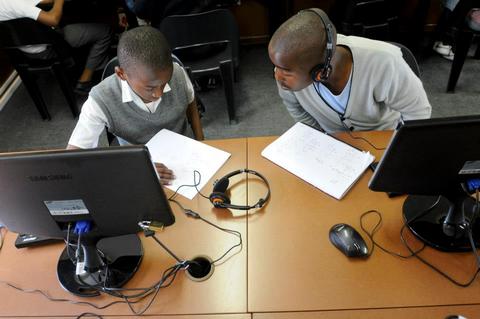
Now, townships in South Africa get a bad rap. They are viewed as ‘dangerous’ places and it is considered unwise to visit them unless you know someone there, or visit them as part of a ‘township tour’. Yet while crime rates in these areas are often high, the reputation does not do justice to the vibrant and persevering people who inhabit them. In particular, townships are YOUNG! On any given day, around two o’clock in the afternoon, the streets flood with uniformed, backpack-toting children on their way home from school. And despite having barely two pennies to rub together, they are meticulously dressed – shiny black shoes, starched white collars – and have aspirations to match. Most of the children in South Africa live in some form of township, which means that children growing up in these environments constitute the better part of the future of our country.
And yet it is supremely difficult to convince our best teachers to go and work in these areas. They are offered good jobs in well-resourced schools most often located in the wealthy suburbs of the cities. Principals at these schools compete fiercely for their skills. And this is as it should be. But it also entrenches the educational bias whereby a child’s access to quality education is directly proportional to the wealth of their family (see chart below).

* University exemption rate refers to the percentage of learners who attain the academic marks in their final year of school that are necessary to gain access to South African universities.
So Numeric’s experiment was to see whether we could use Khan Academy, in conjunction with a slightly less skilled (and often unqualified) math coach, to create the high impact and stimulating learning environments enjoyed by kids living in wealthier suburbs.
The opportunity provided by Khan Academy premised on the following: Videos do not argue about where they are played; they are unaffected by crime and environment. Appropriately licensed, they do not cost anything. They do not grow weary, skip class, or grow jaded. Instead, they convey their message enthusiastically, faithfully, clearly – time and time again. A child may watch just as many videos as he/she has appetite for, and need never feel limited by the dragging on of a boring class or an inept teacher. For many children in South Africa, a Khan Academy video will be their first exposure to what we might term ‘world class instruction’. When complemented by the exercises on the Knowledge Map, Khan Academy becomes a powerful tool for turning the tide on numeracy in South Africa.
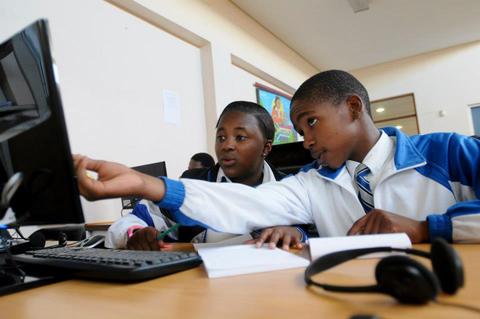
So what were the results of the experiment? Well, it’s probably too early to draw any major conclusions, but we do have a few figures we’d like to share. We currently run 7 Khan Academy classes across 3 different hubs in the Eastern and Western Cape provinces of South Africa. The first pilot group of 20 Grade 9s has just completed its first twelve months of Khan Academy and their numbers are as follows:
* Total Khan Academy hours delivered: 2220
* Total Problems Solved: 27,988
* Total Problems per learner: 1399
* Total Khan Modules Complete: 1232
* Average Modules per learner: 62
Bearing in mind this is an afterschool programme, these are 27,988 math problems that would not otherwise have been attempted. The 62 modules completed by the average learner constitute 62 gaps that those learners have filled. But it’s more about just the numbers; it’s about creating excitement and enthusiasm around learning. This is hard to convey in words, but perhaps a picture will suffice.
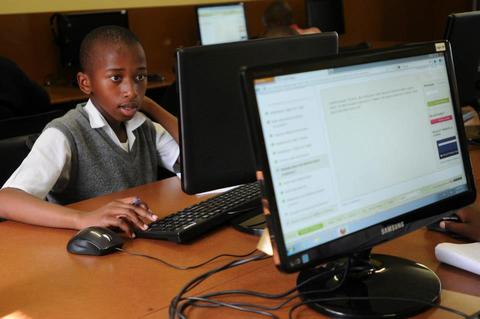
As we always say to our coaches, the tragedy in South Africa is not so much that kids don’t want to learn. It’s that some kids DO want to learn, but can’t. Khan Academy provides us one way to give these kids a world-class education without having to magically replenish our nation’s supply of teachers. And who knows, perhaps one day these kids will become the inspirational and talented teachers we have waited for for so long!
—-
Andrew Einhorn is the founder and current CEO of Numeric.org. His TEDx talk on Numeric.org and Khan Academy is available here.
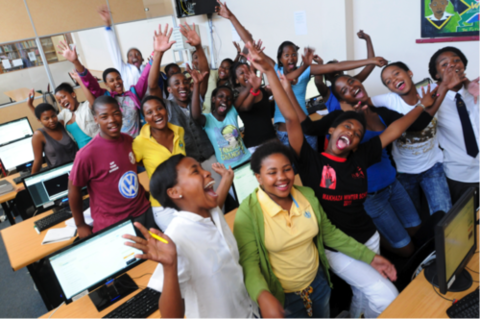
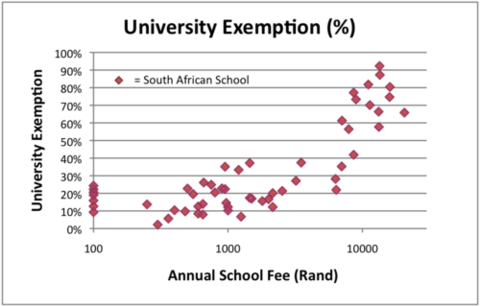
Just over a year ago I was approached by Andrew Einhorn, a UCT grad student, who was interested in implementing an online maths program at Makhaza. All he needed was access to the lab, access to a class and a tutor. A year down the line not only he has completely revamped two of our branches labs in Makhaza and Nyanga, established a formal Khan Academy program in these branches (as well as other locations in Cape Town and rural Eastern Cape), but has produced results at very low costs, and is piloting in schools for 2013.
His passion for creating high impact and stimulating learning environments in township and rural locations often only privy to the wealthy few has seen him start Numeric, an NGO interested in finding ways to bring Khan Academy to South Africa and make it a useful resource to both teachers and learners. He presented an inspiring TEDxUCT talk last year outlining the background, as well as the impact and results Numeric has had. He also posted the following blog on the Khan Academy website:

A little over 15 months ago, we started an experiment. We wanted to know if Khan Academy was viable in township (slum) areas in South Africa and if so, what type of impact it might have on numeracy. Numeracy in South Africa is astonishingly weak, with just 2% of Grade 9s scoring over 50% on the annual national assessments in 2012.
And so we set out to see if Khan Academy might be used as a catalyst for change. But before I expound on the results of this experiment, I ought perhaps give a little more background on the environments we’re working in.
Townships in South Africa are not unlike the favelas of Brazil or the slums bordering Delhi and Calcutta in India. They are urban areas that were, until the end of Apartheid in 1994, reserved for non-whites, but have now become residential hubs for the urbanizing masses. They are typically built on the periphery of cities and tend to be characterized by high population density, poverty and unemployment. Picture a ramshackle of makeshift houses constructed out of corrugated iron, wood scraps and cardboard, jigsawed together into a gigantic maze 5 miles wide and 10 miles across. At the risk of generalising grossly, that’s more or less the picture I want you to have in mind as you read this article.

Now, townships in South Africa get a bad rap. They are viewed as ‘dangerous’ places and it is considered unwise to visit them unless you know someone there, or visit them as part of a ‘township tour’. Yet while crime rates in these areas are often high, the reputation does not do justice to the vibrant and persevering people who inhabit them. In particular, townships are YOUNG! On any given day, around two o’clock in the afternoon, the streets flood with uniformed, backpack-toting children on their way home from school. And despite having barely two pennies to rub together, they are meticulously dressed – shiny black shoes, starched white collars – and have aspirations to match. Most of the children in South Africa live in some form of township, which means that children growing up in these environments constitute the better part of the future of our country.
And yet it is supremely difficult to convince our best teachers to go and work in these areas. They are offered good jobs in well-resourced schools most often located in the wealthy suburbs of the cities. Principals at these schools compete fiercely for their skills. And this is as it should be. But it also entrenches the educational bias whereby a child’s access to quality education is directly proportional to the wealth of their family (see chart below).

* University exemption rate refers to the percentage of learners who attain the academic marks in their final year of school that are necessary to gain access to South African universities.
So Numeric’s experiment was to see whether we could use Khan Academy, in conjunction with a slightly less skilled (and often unqualified) math coach, to create the high impact and stimulating learning environments enjoyed by kids living in wealthier suburbs.
The opportunity provided by Khan Academy premised on the following: Videos do not argue about where they are played; they are unaffected by crime and environment. Appropriately licensed, they do not cost anything. They do not grow weary, skip class, or grow jaded. Instead, they convey their message enthusiastically, faithfully, clearly – time and time again. A child may watch just as many videos as he/she has appetite for, and need never feel limited by the dragging on of a boring class or an inept teacher. For many children in South Africa, a Khan Academy video will be their first exposure to what we might term ‘world class instruction’. When complemented by the exercises on the Knowledge Map, Khan Academy becomes a powerful tool for turning the tide on numeracy in South Africa.

So what were the results of the experiment? Well, it’s probably too early to draw any major conclusions, but we do have a few figures we’d like to share. We currently run 7 Khan Academy classes across 3 different hubs in the Eastern and Western Cape provinces of South Africa. The first pilot group of 20 Grade 9s has just completed its first twelve months of Khan Academy and their numbers are as follows:
* Total Khan Academy hours delivered: 2220
* Total Problems Solved: 27,988
* Total Problems per learner: 1399
* Total Khan Modules Complete: 1232
* Average Modules per learner: 62
Bearing in mind this is an afterschool programme, these are 27,988 math problems that would not otherwise have been attempted. The 62 modules completed by the average learner constitute 62 gaps that those learners have filled. But it’s more about just the numbers; it’s about creating excitement and enthusiasm around learning. This is hard to convey in words, but perhaps a picture will suffice.

As we always say to our coaches, the tragedy in South Africa is not so much that kids don’t want to learn. It’s that some kids DO want to learn, but can’t. Khan Academy provides us one way to give these kids a world-class education without having to magically replenish our nation’s supply of teachers. And who knows, perhaps one day these kids will become the inspirational and talented teachers we have waited for for so long!
—-
Andrew Einhorn is the founder and current CEO of Numeric.org. His TEDx talk on Numeric.org and Khan Academy is available here.

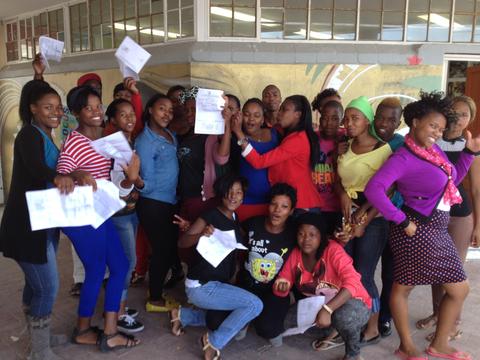
Right now, learners all across the country are either celebrating or commiserating after receiving their matric results. And the national numbers seem to suggest that whether matriculants are partying or weeping has a lot to do with their level of economic privilege and the resources of their schools.
But in townships around South Africa, a very special group of matriculants with a whole lot of reasons to celebrate are bucking that trend, and proving that the seemingly impossible is possible with hard work and a little help from one’s friends.
These young people are the ikamvanites, and this week they overcame all the challenges of their circumstances to achieve a national pass rate of 89% and an incredible 100% pass rate in both Gauteng and KwaZulu-Natal – results far more privileged learners would be proud of!
Those aren’t just 30% passes either: 87% of ikamvanites achieved the Bachelor or Diploma passes they need to take their education to the next level and access the kinds of opportunities they need to fulfil their dreams of supporting and uplifting their families. Most remarkable of all, these learners aren’t waiting to uplift their communities, and 72% have already become volunteer tutors for the next cohorts of learners; ensuring the exponential replication of the IkamvaYouth model and reach.
Mamphela Ramphele reports that she’s thrilled to witness IkamvaYouth’s incredible growth and enormous impact. “IkamvaYouth saves learners from despair and grinding poverty and most importantly gives them hope… the organisaton’s sustainable model, extra-ordinary commitment and exceptional results inspire our nation.”
Talent Chinogureyi, an ikamvanite in Chesterville, KZN, enthused, “I want to go to university and study further so that when I graduate I can be the one to eradicate poverty at home.” She achieved a Bachelor pass and a distinction for Accounting and has been accepted to study a B Com at prestigious private Johannesburg institution St Augustine College.
At the Masiphumelele branch of IkamvaYouth in the Western Cape, one learner overcame even more hardship than most. “The majority of people tend to think that once you have fallen pregnant, it is the end of the world. I have proved to them that there is still hope. Through all the hardships, I made it. I got a Bachelor pass… I say B for my Baby,” said Neliswa Mnaheni, who hopes to study Marketing next year.
While this has been a time of celebration for most ikamvanites, it has been very challenging for some. Thankfully, everyone that did not pass is eligible for supplementary exams, and IkamvaYouth will be supporting these learners to ensure that they are well-prepared to excel. Others were traumatised by the ongoing illegal practice of withholding results due to unpaid school fees or outstanding textbooks. While IkamvaYouth was able to step in and support families with school fee contributions thanks to its donors, there are thousands of learners across the country who do not have access to this kind of support. “The no-fees-no-report practice is unjust, humiliating and illegal and needs to end”, says Joy Olivier, director of IkamvaYouth. “Our learners need these results in order to realise their dreams and schools need alternative avenues to access much-needed funds”.
IkamvaYouth’s work with the class of 2012 is also far from over. While many of those who passed have already been accepted by the country’s top universities, there is still work to be done to ensure that none of the class of 2012 become unemployed. The next step is ensuring that all these learners access tertiary education, training, internships, learnerships or employment. “IkamvaYouth will continue to support all our 2012 matrics as they access quality post-school opportunities and become tutors; enabling the following years’ learners to do the same,” says Zamo Shongwe, IkamvaYouth’s national coordinator.
IkamvaYouth invites everyone to get involved. There are branches in the Western Cape (Khayelitsha, Nyanga and Masiphumelele); KZN (Chesterville and Umlazi) and Gauteng (Ivory Park, and Ebony Park), North West (a new branch opening in Potchefstroom) and the Eastern Cape (a new branch opening in Grahamstown). IkamvaYouth has maintained a matric pass rate of between 85 and 100% each year since 2005, and true credit for these results must go to the learners, volunteers, the branch teams, partner organisations and donors.


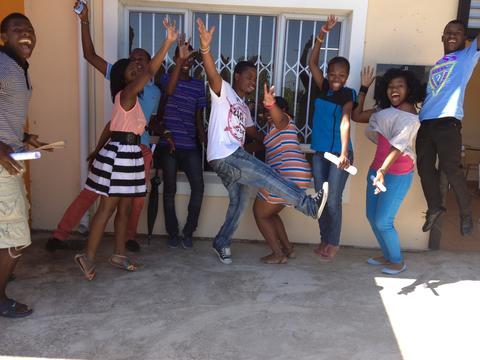
The solutions and innovations that will change the world – the cure for AIDS, technologies that will curb environmental destruction, art that unites and inspires – are inside young minds. Young minds that need an education so that these solutions can be developed and tapped. Sadly, most South African youth are enrolled in schools that struggle with the basics – from textbook distribution to learner safety – and so are denied the kind of education that engenders problem solving, innovation and leadership.
However, there is a fast-growing group of young people who refuse to be hopeless or overwhelmed. They are the ikamvanites: learners, tutors and social entrepreneurs who’ve developed an innovative solution to the problems of poor academic achievement and low access to tertiary education. Today, their branches in Gauteng and KZN are celebrating their 100% pass rate and 56% bachelor passes. Overall, 91% have achieved the bachelor or diploma passes they need to access tertiary education. Many ikamvanites excelled (22 distinctions achieved so far overall). “Education is the only thing that can catapult me, a daughter of a domestic worker, into the position where I can make gigantic improvements in our country and continent, by stimulating entrepreneurship, promoting education and tackling crime,” says Ntebaleng Morake, who achieved four distinctions. She’s been accepted at both Wits and UCT and will be studying Law and Politics next year.
The branches are celebrating their results with learners, tutors and parents. “IkamvaYouth has been incredible in helping my child to achieve so much at school. I am so happy today. Now- she has been accepted in three places- and we are confused what option she will take, though I know there are some out there who do not have even one option. Thank you, IkamvaYouth!” enthused Mrs Makhubele.
The Western Cape results will only be available either later this afternoon (according to WCED website) or tomorrow (according to the DBE). However, learners are currently arriving at the branches in Nyanga, Makhaza and Khayelitsha to share their results with their fellow ikamvanites and celebrating their bright futures.
“We’re very proud of all the learners and tutors and thankful to IkamvaYouth’s supporters who enable these life-changing results”, says Sbusiso Kumalo, board member of IkamvaYouth and head of Capitec’s Corporate Affairs. The tutors who help the learners to reach these heights are all volunteers. Most are university students and many are ex-learners from IkamvaYouth. They’re also the organisation’s greatest benefactors: this year, ikamvanites will be delivering the equivalent of well over 7 million rands’ worth of tutoring time to learners in nine townships in five provinces. The result of this phenomenal investment is an intensive, high quality programme that offers ongoing individual attention and support to learners for between R5k and R6k per learner per year.
IkamvaYouth is a by-youth, for-youth volunteer-driven initiative that was established in 2003 and has since been expanding across the country. There are no academic prerequisites for enrollment in the programme, which is free of charge. Most learners join with abysmal academic results and are from impoverished homes with unemployed caregivers. The impact of the programme is phenomenal. As Asanele Swelindawo, an orphan who managed to get three distinctions, says, “I now have the ticket to improve my life and one day be able to take care of my family”.
The full national results will be released once data from the Western Cape is available. IkamvaYouth sends an open invitation to all who want to join in the celebrations at their branches.

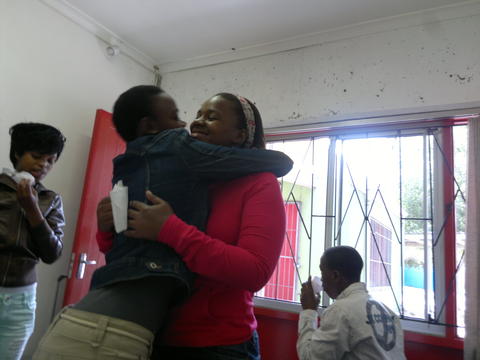
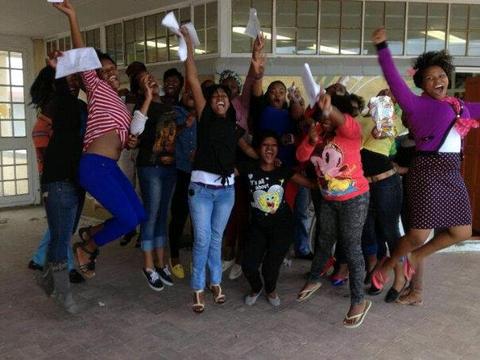
CONTACTS:
National Coordinator: Zamo Shongwe; zamo@ikamvayouth.org; +27837347246
Western Cape Coordinator: Liesel Bakker: liesel@ikamvayouth.org +27798854372
Gauteng Coordinator: Patrick Mashanda: patrick@ikamvayouth.org; +27 74 673 1215
KZN Coordinator: Thabisile Seme: thabisile@ikamvayouth.org; +27 716109838
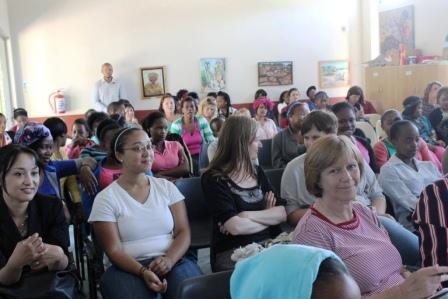
By Sanele Bani (Grade 11 learner)
A group of 100 people composed of parents, partners, volunteers, Masi Library staff and the IkamvaYouth staff were happy to surround and congratulates the 71 Ikamvanites who graduated this year.

Our two masters of ceremony Mawande Sokhaya (ex-learner) and Andisiwe Blou (Grade 12 learner) guided the event in introducing our two motivational speakers: Zintle Mtakati (ex-learner and 2nd year Social Work student at the University of Free State) and Thulisa Mayekiso (graduated student in Psychology at the University of the Western Cape). Thank you to both of them for bringing hope to the current Ikamvanites. In fact, both of them encouraged the audience to deeply believe in their future aspirations, because anyone is able to reach them.
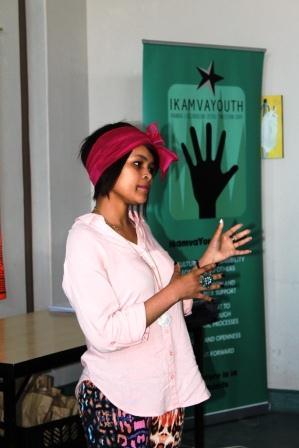
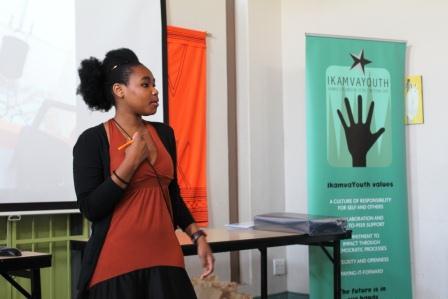
The most anticipated moment was the Attendance awards. 17 Ikamvanites were awarded a Green Certificate – these attended between 75 and 79% of the year. 26 learners got a Silver Certificate – meaning they attended between 80 and 89%. At last, 13 learners received the Gold distinction for being committed, between 90 and 100% attendance. The Silver and Gold learners received a stationery pack and a memory stick. Thank you to the Capitec Bank CSI team.
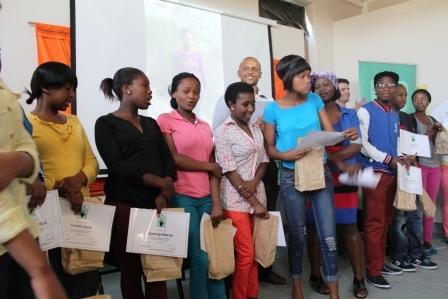
4 more categories were awarded and each received a computer from Capitec Bank CSI. These were:
Uviwe Nqwelo for “Most improved learner”, Ntebuheleng Stuurman and Bongiswa Ngxanga for “Most committed learner”, and Phumza Kibi for “learner of the year” voted by the learners and for “Outstanding leadership”.
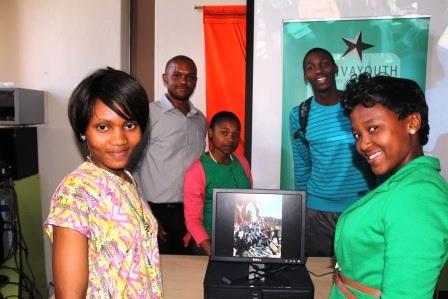
The Masi Branch is happy to thank all the people who are making a difference in the lives of hundreds of learners: the Masiphumelele Library staff , Lea-Ann Moses Magerman (from Capitec Bank), Mignon Hardie (from Cover2Cover), Kwezi Bonani (UCT Humanities recruitment officer), Annemarie Ludick (from the University of Free State), Marjan Ritchie (from MasiCorp), Jen Rousseau (from the Desmond Tutu Youth Centre), Julian (from Pick n’ Pay Family store in Fish Hoek), Kenneth McClarty (from the Olympia Bakery), the Environmental Resource Management team and the WorldTeach and GapYear Volunteers
Thank you for your generosity, through your donations, time, opportunities which will make the future brighter for our communities.

Around 2.30pm on Saturday 20 October, the first parents crossed the library doors to attend the Term 4 Parent’s meeting.
Besides explaining the IkamvaYouth aim, we first communicated the IkamvaYouth vision to the parents: “1,000,000 learners will be passing matric with flying colours in 2030, getting access to post school opportunities and generating a dignified income”. In fact we want to make them dream with us, to make them feel integrated to the process of making a difference.

In order to reach the stars, we need a high commitment from both parents and learners. Therefore we made a point on the attendance process, kick-outs, school report collection and analysis. Simultaneously, the Masi branch needs to have a pool of regular tutors. We invited the parents to come and tutor and/or recommend some of their friends who might be interested. In fact, offering a good tutoring quality comes from the small tutoring groups (1 tutor for 5 learners). At last, parents asked questions around how to get more involved and having more feedback from IkamvaYouth.
Thank you to all the parents who are one of our partners of choice in Education. Let’s take another step together!
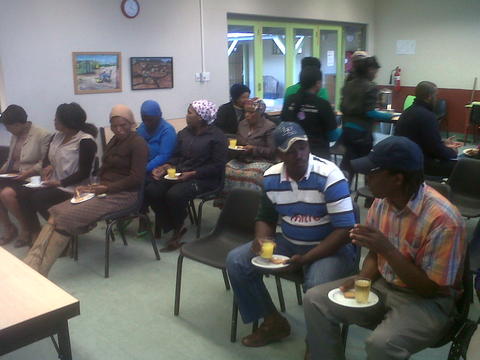





















 Lloyd Lungu
Lloyd Lungu